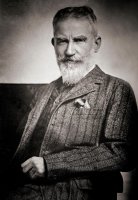 Bernard Shaw was a famous Irish dramatist, novelist, and Ireland's most famous literary figure. In 1925 he received the Nobel Prize in Literature. In 1939 he was awarded an Oscar for the screenplay for Pygmalion.
Bernard Shaw was a famous Irish dramatist, novelist, and Ireland's most famous literary figure. In 1925 he received the Nobel Prize in Literature. In 1939 he was awarded an Oscar for the screenplay for Pygmalion.
Before becoming a brilliant, unique, and wise connoisseur of human nature, Bernard Shaw had a difficult journey. He was rejected sixty times by various publishers, he was told to do other things and not to take time away from busy people, but Shaw stubbornly pursued his goal, and still became a writer, and what a one! It was he who created the theatrical genre, called the drama-discussion. In his works there is a struggle of hostile ideologies, the author analyzes the social and ethical problems.
George Bernard Shaw was born on July 26, 1856 in the Irish capital, Dublin. The father of the future dramatist was named John Shaw, he was engaged in the grain trade, but by the time of his son's birth he was completely broke and began to drink heavily. Mother was Lucinda Shaw, a professional singer. Bernard had two sisters, Lucinda Frances, who later became a theatrical actress, and Elinor Agnes, who died at twenty from tuberculosis.
The boy first attended Dublin's Wesley College, and at the age of eleven he continued at the Protestant school. The teachers of this school were not very eager to teach children the exact sciences, the spiritual development of the pupils was in the first place. The school often used physical punishment of children in the form of whipping. According to the pastors, the children benefited from it.
Bernard hated school, as well as the educational system. He did not want to study, so he did poorly and was considered the worst student in his class. But he loved to read, and could sit at a book endlessly. The boy waited until those lessons were finally over to go to the library, where the whole world was open to him.
At the age of fifteen, the boy dropped out of school and, with the help of his father's friends, got a job. His working life began as a clerk in a real estate office. A year later, the talented boy was transferred as a cashier, and he had more free time, which he devoted to his favorite activity. Bernard did not particularly enjoy his work; what he disliked most was collecting money from the poor for housing. This difficult period in his life is reflected in the play The Widower's House.
In 1872, Shaw's parents broke up. Mother and her daughters left their alcoholic father and moved to London. Sixteen-year-old Bernard stayed in Dublin with his father, continuing to work in the same office. Four years later, the young man moved to London to his mother, found a job at the capital newspaper and began to self-study. Immediately after arriving in the British capital, Shaw spent large amounts of time in museums and libraries, he tried to fill the gaps in his education. His mother was earning by practicing singing lessons, Bernard became interested in socio-political issues.
In 1884, the future dramatist became a member of the Fabian Society, which got its name from Fabius, the famous Roman general. Slowness, caution and the ability to wait - these three traits of Fabius' character helped him to defeat his enemies. The Fabians adhered to the basic idea that socialism was the only possible way for the country to develop. But no revolutions and coups, Britain must come to it gradually.
In those same years Bernard Shaw met the writer Archer, and the result of this acquaintance was Shaw's decision to try his hand at the journalistic profession. He first found work as a freelance correspondent, then for six years he held the post of music critic in the London World. For the next three years he published a column in the Saturday Review, in which he covered issues related to the theater.
 In parallel with his work as a journalist, Bernard began to write novels. However, at the time there were no publishers who agreed to publish them. In 1879-1883, he became the author of five novels, and the first came out of print only three years later, in 1886. According to critics who analyzed the author's early writings years later, his novels were characterized by unique features that have become the writer's style - the briefness in describing situations and dialogues filled with paradoxes.
In parallel with his work as a journalist, Bernard began to write novels. However, at the time there were no publishers who agreed to publish them. In 1879-1883, he became the author of five novels, and the first came out of print only three years later, in 1886. According to critics who analyzed the author's early writings years later, his novels were characterized by unique features that have become the writer's style - the briefness in describing situations and dialogues filled with paradoxes.
In those years Bernard Shaw's idol was the Norwegian writer Henrik Ibsen. In 1891, Shaw published a book called The Quintessence of Ibsenism, in where he touched on the main characteristics of the Scandinavian dramatist's works. Theaters at the time ran mostly the plays of William Shakespeare, sometimes diluted with minor comedies and melodramas. Shaw argued that it was Ibsen who brought a new direction to European drama; he was able to reveal poignant conflicts and character discussions.
In the late 19th and early 20th centuries, Shaw, as a man with a fully formed worldview, wrote works that became all-time masterpieces - Caesar and Cleopatra, Major Barbara, Pygmalion, The Man and the Superman.
In its complexity, and versatility, Pygmalion is hard to match. Many critics and writers have studied it and published an incredible number of books and monographs. The main characters of the play are a poor flower seller Eliza Doolittle and her admirer - a noble and wealthy gentleman of the world Higgins. He decided that he could turn the flower girl into a lady of high society, as Pygmalion once turned a piece of marble into the beautiful Galatea.
After this war, Shaw realized that the ideas of socialism appealed to him more and more. Until his death, the playwright glorified socialist Russia, believing it to be an example for all developed countries. He said that the USSR is the only true and correct path. By the end of his life Shaw fully accepted the ideas of Stalin's regime, he even visited the Soviet Union in 1931.
The works of Bernard Shaw became very popular after his death. They can be seen on many of the world's theatrical stages and are still relevant today. The second half of Bernard Shaw's life was spent in Hertfordshire, in a cozy two-story house, which was literally buried in the greenery. The couple settled there in 1906, and Shaw lived there until his death in 1950.
By the end of his life, the great writer was gradually losing his loved ones. In 1940, his beloved Stella, who was called his secret lover, died. Their feelings were mutual. Three years later, in 1943, passed away faithful wife Charlotte. Last few months before his death, Bernard had not risen from his bed. Consciousness did not leave him for a minute, the writer bravely looked into the eyes of death. Shaw died on November 2, 1950 from kidney failure. He was 94 years old. The writer left a will according to which he was cremated after his death, and his ashes were scattered along with those of his beloved Charlotte.
For a long time Bernard Shaw was unrecognized, and his work remained in the shadows. Many publishers refused to publish him. However, despite all the difficulties, he got his way, and from an unknown author he turned into one of the most popular dramatists, not only in England, but all over the world. Shaw understood that only the movement on the right path, chosen once, will lead to the realization of plans and aspirations. This leitmotif sounds in almost all the works of the famous author, who became a classic of playwriting during his lifetime.


